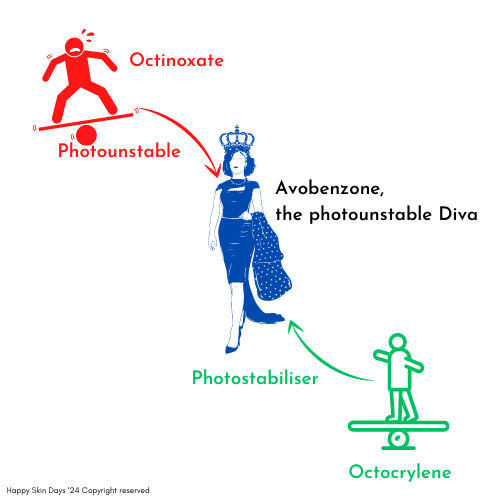No 23 on the #sephora #bestselling #sunscreen list (USA version) is a mineral sunscreen by #supergoop. This is a novel formula in that its anhydrous and the base is a silicone elastomer gel. You can read more about it here . No 24 is Paula’s Choice, and read about it here
That takes to the end of the list, No 25, which is Dr Jart+ Every Sun DayTM Face Sunscreen SPF 50+. This is a non-mineral sunscreen.
1) Ingredient List
-Broad-Spectrum SPF 50: Defends against skin-damaging and visibly aging UV rays. Water, Homosalate, Ethylhexyl Methoxycinnamate, Propanediol, Ethylhexyl Salicylate, Alcohol, Octocrylene, Butyl Methoxydibenzoylmethane, Benzotriazolyl Dodecyl p-Cresol, Pentylene Glycol, 1,2-Hexanediol, Lavandula Angustifolia (Lavender) Oil, Silica, Dimethicone/Vinyl Dimethicone Crosspolymer, Ammonium Acryloyldimethyltaurate/VP Copolymer, Styrene/Acrylates Copolymer, Ethylhexylglycerin, Hydroxypropyl Methylcellulose Stearoxy Ether, Polyacrylate Crosspolymer-6, Butylene Glycol, BHT, T-Butyl Alcohol, Tocopherol.
Source: Sephora USA website (as at 17 Jan 2024)
2) What are the UV Filters?
The UV Filters are: Homosalate, Octinoxate, Octisalate, Octocrylene and Avobenzone. Apart form Avobenzone all the filters are UVB filters, with varying degrees of efficacy. (Both Homosalate and Octisalate are weak UVB filters), but Octocrylene and Octinoxate are stronger UVB filters.
In terms of the UVA filter, the product relies solely on Avobenzone, which is a gold standard albeit photo-unstable filter.
Available evidence shows Avobenzone degrades quickly upon exposure to sunlight, reducing its efficacy by as much as 50 and 90 per cent after 60 minutes of exposure. This product uses Octocrylene to stabilise Avobenzone.
The sunscreen also includes Octinoxate which makes the Avobenzone unstable (as well as making the Octinoxate less effective). The study listed below shows that a mixture of Octinoxate and Avobenzone shows less absorbance after UV exposure, indicating less efficient UV filter system Click on LINK for more information.

3) Formulation breakdown
This is a new style formulation, which uses a combination of gelling agents as emulsifiers. The oily-emollient component of the formula is deliberately kept low and instead, stability and structure is provided by these thickeners/gelling agents etc
3a) Emulsifiers/Thickeners are
- Sepimax Zen (Polyacrylate Crosspolymer-6)
- Aristoflex AVC (Ammonium Acryloyldimethyltaurate/VP Copolymer)
According to the manufacturer, “Aristoflex AVC is a synthetic polymer used as a gelling agent for aqueous systems and as a texturizer and thickener for oil-in-water emulsions. This product has a good compatibility with organic solvents (ethanol, acetone) and is stable towards UV radiation.”
3b) Solvent/Emollient dispersion mechanism:
- Alcohol (and) Water (and) T-Butyl Alcohol
- Propanediol (?)
- Butylene Glycol (?)
3c) SPF Boosters
According to the manufacturer, “Carfil® WR2 (Styrene/Acrylates Copolymer) is especially designed for suncare products to increase water–resistance and boost SPF.“
3d) Improves skin-feel of product
Dimethicone/Vinyl Dimethicone Crosspolymer (silicone elastomers without PEG)
3e) Preservative system
- BHT
- Butylene Glycol(?)
- Tocopherol (?)
- Propanediol (?)
- Tinogard TL (Benzotriazolyl Dodecyl p-Cresol)
According to the manufacturer, “Tinogard® TL is a broadband UV absorber for stabilization...providing long-lasting shelf life even with light sensitive formulations.”